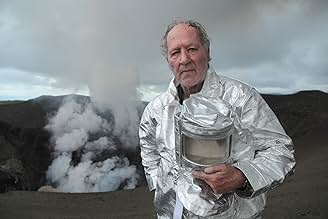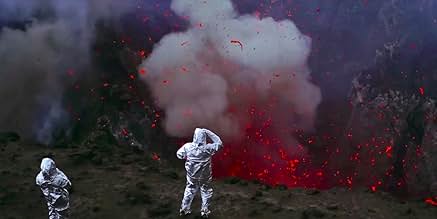IMDb-BEWERTUNG
7,2/10
10.510
IHRE BEWERTUNG
Eine Erkundung aktiver Vulkane auf der ganzen Welt.Eine Erkundung aktiver Vulkane auf der ganzen Welt.Eine Erkundung aktiver Vulkane auf der ganzen Welt.
- Auszeichnungen
- 5 Nominierungen insgesamt
Maurice Krafft
- Self - Volcanologist
- (Archivfilmmaterial)
Katia Krafft
- Self - Volcanologist
- (Archivfilmmaterial)
William McIntosh
- Self - Volcanologist
- (Archivfilmmaterial)
Empfohlene Bewertungen
This documentary does not try to scientifically explore volcanoes, it's about the emotional impact volcanoes have on human beings.
On a subjective level, looking into the red bubbling abyss was pleasant and terrifying at the same time.
On a subjective level, looking into the red bubbling abyss was pleasant and terrifying at the same time.
You might think that this is a documentary about volcanoes
in which case you wouldn't be wrong. However you have to keep in mind that this is a Werner Herzog documentary about volcanoes. Herzog is not so much interested in the facts about volcanoes (I'm sure he'd tell you to read a book if you want facts) but what volcanoes can tell us about ourselves and about us as a species.
So how does he do it, you might ask. Herzog reaches very far back, very far, in fact right back to the dawn of man – through an archaeological expedition in Ethiopia that aims to uncover a complete skeleton of such an ancient human beneath the blazing sand. And indeed Herzog captures something prehistoric with this documentary; amidst our digital age which often tricks us to believe we've conquered nature, he renders man once again so incredibly small and fragile against the (in contrast) everlasting thermal forces of the earth.
Herzog explores this feeling of impuissance by traveling to tribal communities in the Pacific and by exploring the state of North Korea and the oppressive, propagandistic cult around their leaders (with some at times truly fantastic footage, you have to keep in mind that it's almost impossible to get a permit to film there). In both communities a volcano plays an important role and Herzog expresses multiple times his interest in how volcanoes "create new gods", once again questioning the permanence of our culture which we so often take for granted.
In the end what makes this movie so special is that it's surprisingly contemporary despite being about a phenomenon (volcanos) that is almost as old as the earth itself and that Herzog found new ways to once again render the Vanitas motif from medieval times vividly alive. Herzog reminds us that even today with all out technological progress, we are still small, fragile animals against the mighty forces of nature. Memento Mori, they said in the Middle Ages, remember that you have to die.
Some have commented that the film is really shattered; however I'd argue that it's actually really focused on its theme. Don't expect my review to follow the film chronologically though, it takes it's very own spins and turns. And don't expect the film to be sad, it's actually quite witty and filled with funny ironies. Likewise it assembles a large array of different great and fascinating footage from all around the world. However I'd still like to leave you with a famous old poem from one of Herzog's fellow countrymen (which I'm convinced he knows as well), here's Friedrich Hölderlin's "Hyperion's Song of Fate" (be sure to read it in its original German form if you speak the language):
Up there you walk through the light on delicate grounds, Elysian Spirits! Shimmering breezes of Gods touch you as softly as the hand of the harpist touches her sacrosanct strings.
Unencumbered by fate, like a slumbering newborn, are breathing the heavenly dwellers; chastely protected by a bud unassuming flowers for them eternal the spirit and their hallow'd eyes shine in serene clearness forever.
But to us it was given never and nowhere to rest: we suffering humans vanishing, falling blindly from one hour to the next are thrown like the water cliff down to cliff, yearlong into the unknown abyss.
So how does he do it, you might ask. Herzog reaches very far back, very far, in fact right back to the dawn of man – through an archaeological expedition in Ethiopia that aims to uncover a complete skeleton of such an ancient human beneath the blazing sand. And indeed Herzog captures something prehistoric with this documentary; amidst our digital age which often tricks us to believe we've conquered nature, he renders man once again so incredibly small and fragile against the (in contrast) everlasting thermal forces of the earth.
Herzog explores this feeling of impuissance by traveling to tribal communities in the Pacific and by exploring the state of North Korea and the oppressive, propagandistic cult around their leaders (with some at times truly fantastic footage, you have to keep in mind that it's almost impossible to get a permit to film there). In both communities a volcano plays an important role and Herzog expresses multiple times his interest in how volcanoes "create new gods", once again questioning the permanence of our culture which we so often take for granted.
In the end what makes this movie so special is that it's surprisingly contemporary despite being about a phenomenon (volcanos) that is almost as old as the earth itself and that Herzog found new ways to once again render the Vanitas motif from medieval times vividly alive. Herzog reminds us that even today with all out technological progress, we are still small, fragile animals against the mighty forces of nature. Memento Mori, they said in the Middle Ages, remember that you have to die.
Some have commented that the film is really shattered; however I'd argue that it's actually really focused on its theme. Don't expect my review to follow the film chronologically though, it takes it's very own spins and turns. And don't expect the film to be sad, it's actually quite witty and filled with funny ironies. Likewise it assembles a large array of different great and fascinating footage from all around the world. However I'd still like to leave you with a famous old poem from one of Herzog's fellow countrymen (which I'm convinced he knows as well), here's Friedrich Hölderlin's "Hyperion's Song of Fate" (be sure to read it in its original German form if you speak the language):
Up there you walk through the light on delicate grounds, Elysian Spirits! Shimmering breezes of Gods touch you as softly as the hand of the harpist touches her sacrosanct strings.
Unencumbered by fate, like a slumbering newborn, are breathing the heavenly dwellers; chastely protected by a bud unassuming flowers for them eternal the spirit and their hallow'd eyes shine in serene clearness forever.
But to us it was given never and nowhere to rest: we suffering humans vanishing, falling blindly from one hour to the next are thrown like the water cliff down to cliff, yearlong into the unknown abyss.
I skipped the boring parts! Which are all the parts that has nothing to do with volcanoes and eruptions so it becomes interesting and great show to me :)
The only part which is not about volcanoes and was really interesting is the one about North Korea and a little of the John From faith :) 👌🏻
The only part which is not about volcanoes and was really interesting is the one about North Korea and a little of the John From faith :) 👌🏻
I enjoyed the volcano parts. The right turns into cultural ideologies made no sense. Pick a topic already.
Whilst this film does contain some outstanding images of volcanoes, eruptions and lava, these parts are few and far between.
I was hoping for an exploration of the power and activity of volcanoes around the world, but was only given a glimpse of a few sites, with very little in terms of information about how volcanic action actually arises.
This doc focuses more on worldwide spiritual views around volcanoes, with some superficial information about the effects of eruptions on our planet.
Wusstest du schon
- WissenswertesWas one of the very few movies that was filmed in North Korea.
- Zitate
Werner Herzog: It is a fire that wants to burst forth and it could not care less about what we are doing up here
- SoundtracksUnfailing Light
Performed by the Monks Choir of Kiev Pechersk Monastery
Traditional
Courtesy of Origen Music
Top-Auswahl
Melde dich zum Bewerten an und greife auf die Watchlist für personalisierte Empfehlungen zu.
- How long is Into the Inferno?Powered by Alexa
Details
Box Office
- Weltweiter Bruttoertrag
- 3.679 $
- Laufzeit
- 1 Std. 44 Min.(104 min)
- Farbe
- Seitenverhältnis
- 1.85 : 1
Zu dieser Seite beitragen
Bearbeitung vorschlagen oder fehlenden Inhalt hinzufügen


















